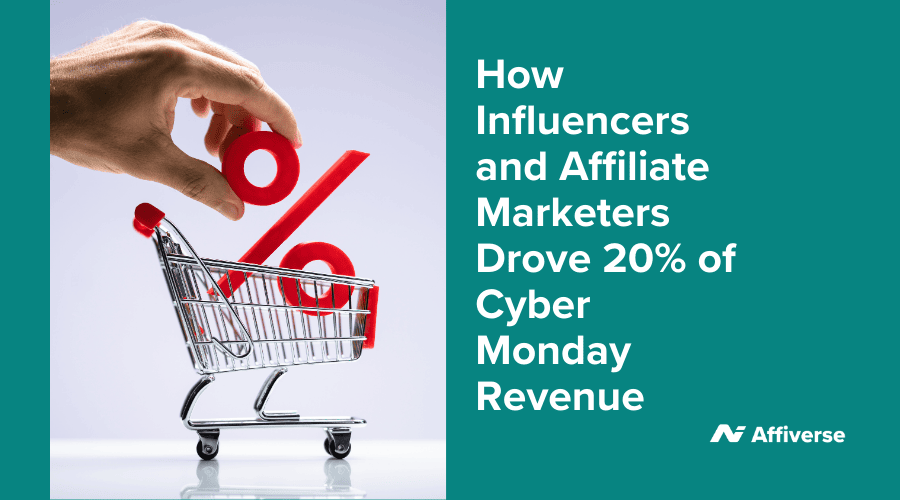How Influencers and Affiliate Marketers Drove 20% of Cyber Monday Revenue

Cyber Monday 2024 shattered records, with influencers and affiliate marketers playing a significant role in its success. This year, these digital marketing powerhouses contributed to 20% of all e-commerce revenue generated during the event—a remarkable 7% increase from the previous year.
As brands increasingly lean on these partnerships to drive conversions, this shift signals a growing reliance on social media creators and affiliate networks to capture consumer attention in an increasingly competitive online shopping landscape.
Let’s explore how influencers and affiliate marketers drove these impressive results, what it means for the future of e-commerce, and how brands and affiliates can capitalise on these trends.
The rising power of influencers in e-commerce
Influencers have become an integral part of online shopping, thanks to their ability to connect with audiences on a personal level.
From Instagram reels to TikTok reviews, creators use engaging content to showcase products in ways that resonate with their followers. This year, their impact was especially evident during Cyber Monday.
Why influencers drive conversions:
1. Authenticity matters
Consumers trust influencers because they feel like recommendations are coming from a friend rather than a salesperson. This authenticity builds trust and drives purchasing decisions.
2. Engaging content formats
Short-form video content, live shopping events, and unboxing videos make the shopping experience interactive and enjoyable, encouraging viewers to take immediate action.
3. Access to younger demographics
Influencers excel at reaching younger audiences, particularly Gen Z and Millennials, who prefer discovering products through social media over traditional advertising. In fact, 52% of consumers aged 18-29 reported being influenced by social media creators during Cyber Monday.
The role of affiliate marketers
Affiliate marketers also played a crucial role in driving Cyber Monday revenue. By strategically placing affiliate links in blogs, newsletters, and social media posts, affiliates direct traffic to e-commerce platforms and earn commissions on resulting sales. This model benefits both brands and affiliates, making it a win-win for all involved.
Why affiliate marketing works:
1. Performance-based model
Brands only pay for results, such as clicks, leads, or sales, making affiliate marketing a cost-effective channel. This aligns incentives for both brands and affiliates to maximise conversions.
2. Scalability
Affiliate marketing allows brands to tap into a vast network of content creators and publishers, reaching diverse audiences without needing to build new marketing channels from scratch.
3. Trust-driven sales
Like influencers, affiliates often build trust with their audiences by providing honest reviews and recommendations. Readers are more likely to click on affiliate links when they trust the creator’s opinion.
The synergy between influencers and affiliate marketing
The 2024 Cyber Monday results highlight the growing synergy between influencers and affiliate marketing. Many influencers now operate as affiliates, using their platforms to drive sales while earning commissions. This dual role amplifies their impact, making them an indispensable part of modern e-commerce strategies.
Brands are recognising the value of these hybrid creators, offering exclusive affiliate codes, higher commission rates, and early access to product launches to incentivise participation. This approach not only boosts sales but also strengthens relationships with top-performing partners.
How brands can harness this trend
As the influence of social media creators and affiliate marketers grows, brands must adapt their strategies to maximise results. Here are some actionable steps:
1. Build long-term partnerships
Instead of focusing solely on one-off campaigns, invest in long-term relationships with influencers and affiliates. Providing consistent support, exclusive offers, and meaningful collaboration opportunities fosters loyalty and drives better results over time.
2. Leverage data-driven insights
Use analytics tools to track performance and identify which influencers and affiliates deliver the best ROI. This allows you to allocate resources effectively and refine your campaigns for greater impact.
3. Experiment with new platforms
Platforms like TikTok, Instagram Reels, and YouTube Shorts are dominating consumer attention. Brands that embrace these channels can engage audiences where they spend the most time.
4. Offer competitive incentives
To attract and retain top talent, brands should offer competitive commission rates, bonuses for high performers, and access to exclusive products or experiences.
What this means for affiliates and influencers
For affiliates and influencers, the Cyber Monday results highlight the potential of combining content creation with performance-based marketing. Here’s how they can take advantage:
1. Focus on authenticity
Genuine recommendations resonate more with audiences, leading to higher engagement and conversion rates. Prioritise quality over quantity when choosing partnerships.
2. Diversify content formats
Experiment with live shopping events, video tutorials, and interactive content to keep audiences engaged and encourage clicks.
3. Build a strong personal brand
Influencers who establish themselves as experts in specific niches, such as tech, fashion, or fitness, are more likely to attract lucrative partnerships and loyal followers.
4. Stay informed about trends
Keep an eye on emerging platforms, consumer behaviours, and brand opportunities to remain competitive in a rapidly evolving market.
Looking ahead: The future of e-commerce partnerships
The growing role of influencers and affiliate marketers in driving Cyber Monday revenue is just the beginning. As brands continue to prioritise performance-based partnerships, these creators will play an even larger role in shaping the future of e-commerce.
From leveraging AI to personalise content to exploring the metaverse for immersive shopping experiences, the opportunities are endless. Brands, affiliates, and influencers that adapt to these changes and focus on delivering value to their audiences will be best positioned to thrive.
Cyber Monday 2024 has proven that the combination of social media influence and affiliate marketing is a powerful force in digital commerce. By embracing these trends, businesses and creators alike can unlock new levels of success in the years to come.






